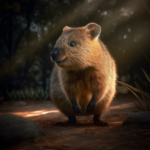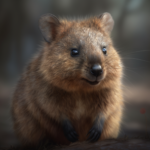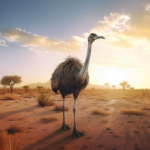Quokkas, often referred to as the “happiest animal on Earth,” are small marsupials native to Western Australia. These adorable creatures have gained significant attention due to their friendly and approachable nature, often approaching humans without fear. However, despite their seemingly carefree existence, there has been growing concern about the conservation status of quokkas. In this article, we will explore whether quokkas are endangered, the factors contributing to their population decline, and the efforts being made to protect these unique animals. So, let’s delve into the world of quokkas and discover the challenges they face in their natural habitat.
Key Takeaways
- Quokkas are not currently classified as endangered.
- However, they are listed as vulnerable due to habitat loss and predation.
- Conservation efforts are crucial to ensure the long-term survival of quokkas.
Understanding Quokkas: An Overview
A. What is a Quokka Animal?
Quokkas are small marsupials native to Western Australia. These adorable creatures belong to the macropod family, which also includes kangaroos and wallabies. Quokkas are known for their friendly and curious nature, making them a favorite among tourists and wildlife enthusiasts.
Quokkas have a unique appearance, with round bodies, short tails, and small ears. They are about the size of a domestic cat, with adults typically weighing between 2.5 to 5 kilograms (5.5 to 11 pounds). Their fur is coarse and varies in color, ranging from brown to gray, with lighter shades on their bellies.
B. What are Quokkas Known For?
Quokkas are best known for their friendly and approachable behavior. They have earned the nickname “the happiest animal on Earth” due to their seemingly constant smile. This adorable expression is a result of their facial structure, rather than their emotional state.
These marsupials are also famous for their ability to take selfies. Due to their friendly nature, quokkas often approach humans, making them the perfect photography subjects. Visitors to Rottnest Island, one of the main habitats of quokkas, often capture memorable moments with these charming creatures.
C. Where are Quokkas Located?
Quokkas are primarily found on Rottnest Island, located off the coast of Western Australia. This island is home to a significant population of quokkas, making it a popular tourist destination for those eager to see these unique marsupials up close.
While Rottnest Island is the main habitat for quokkas, they can also be found on the mainland in small numbers. They inhabit dense vegetation areas, including forests and shrublands. However, their population on the mainland is significantly smaller compared to Rottnest Island.
It is important to note that quokkas are currently not classified as endangered. However, their conservation status is still a concern due to various threats to their habitat and population. In the following sections, we will explore the challenges faced by quokkas and the efforts being made to protect them.
| Quokka Facts | | — | | Scientific Name | Setonix brachyurus | | Conservation Status | Not endangered, but conservation concern | | Habitat | Rottnest Island and mainland Western Australia | | Diet | Herbivorous, feeding on grasses, leaves, and bark | | Reproduction | Quokkas are marsupials, with females carrying their young in a pouch | | Threats | Habitat loss, predation, and human interference | | Conservation Efforts | Wildlife protection laws, habitat preservation, and public awareness campaigns |
The Quokka Habitat: A Closer Look

A. Where are Quokkas From?
Quokkas, known for their adorable smiles and friendly demeanor, are native to the southwestern region of Western Australia. These small marsupials are found primarily in the coastal areas, including Rottnest Island, Bald Island, and the mainland. The unique habitat of the quokka plays a crucial role in their survival and well-being.
Quokkas have adapted to a variety of habitats, including forests, scrublands, and coastal heathlands. They are particularly abundant on Rottnest Island, where the absence of natural predators has allowed their population to thrive. The island’s diverse vegetation provides an ideal environment for these herbivorous marsupials, offering a plentiful supply of food and shelter.
B. Where are Quokkas Found Today?
While quokkas were once more widespread across the southwestern region of Western Australia, their current distribution is limited. Today, the majority of quokkas can be found on Rottnest Island, where they are protected and cherished. The island’s unique ecosystem, coupled with conservation efforts, has helped preserve the quokka population.
In addition to Rottnest Island, quokkas can also be found on Bald Island and in some parts of the mainland. However, their numbers are significantly lower in these areas, making Rottnest Island the primary sanctuary for these adorable marsupials. The island’s conservation programs and strict wildlife protection laws have played a vital role in ensuring the survival of the quokka population.
It is important to note that despite their limited distribution, quokkas are not currently classified as endangered. However, their habitat and population face threats that require ongoing conservation efforts to maintain their numbers and protect their future.
To summarize, quokkas are native to the southwestern region of Western Australia and can primarily be found on Rottnest Island. While they were once more widespread, their current distribution is limited, making conservation efforts crucial for their survival. The unique habitat of Rottnest Island, coupled with strict wildlife protection laws, has helped preserve the quokka population and ensure their continued existence.
The Quokka Population: A Status Update

A. Are Quokkas Endangered or Threatened?
The quokka, a small marsupial native to Western Australia, has gained significant attention in recent years due to its adorable appearance and friendly demeanor. However, concerns have been raised about the status of the quokka population and whether they are endangered or threatened.
The International Union for Conservation of Nature (IUCN) has classified the quokka as a “vulnerable” species, which means they are at risk of becoming endangered if conservation efforts are not implemented. This classification is based on several factors, including habitat loss, predation, and human interference.
B. Are Quokkas Going Extinct?
While the quokka population is not currently facing the immediate threat of extinction, their numbers have been declining in certain areas. The main threat to quokkas is the loss of their natural habitat. As human populations expand and urban areas encroach upon their territory, quokkas are losing the essential resources they need to survive.
One of the significant challenges the quokka faces is the destruction of its habitat due to land clearing for agriculture and urban development. This loss of habitat not only affects the quokka population directly but also disrupts the delicate balance of the ecosystem, leading to biodiversity loss.
C. Are Quokkas an Endangered Species?
While the quokka is not currently classified as an endangered species, it is crucial to recognize the need for conservation efforts to ensure their long-term survival. The quokka population on Rottnest Island, off the coast of Western Australia, is relatively stable and well-protected due to the absence of natural predators. However, on the mainland, quokkas face more significant threats.
Efforts are being made to protect quokka habitat and raise awareness about the importance of preserving this unique marsupial. Wildlife protection laws have been implemented to safeguard their habitat and reduce human interference. Additionally, conservation organizations and researchers are working specifically on quokka conservation projects to monitor their population and implement measures to mitigate threats.
In conclusion, while the quokka population is not currently endangered, it is important to address the threats they face and take action to protect their habitat. By raising awareness, supporting conservation efforts, and promoting responsible tourism, we can ensure the survival of this adorable marsupial for future generations to enjoy.
The Vulnerability of Quokkas: An In-depth Analysis
A. Why are Quokkas Going Extinct?
Quokkas, the adorable marsupials native to Western Australia, have been facing significant threats to their survival. While they are not currently classified as endangered, their population has been declining, raising concerns among wildlife conservationists. So, why are quokkas going extinct?
1. Habitat Loss
One of the primary reasons for the decline in quokka numbers is habitat loss. As human populations expand and urbanization encroaches upon their natural habitats, quokkas are losing the places they call home. The destruction of their habitat limits their access to food, water, and shelter, making it increasingly difficult for them to survive.
2. Predation
Another factor contributing to the vulnerability of quokkas is predation. Introduced predators, such as foxes and feral cats, pose a significant threat to these small marsupials. Quokkas have evolved in isolation, without natural predators, making them ill-equipped to defend themselves against these new threats. As a result, predation has become a significant cause of quokka mortality.
3. Human Interaction
Human interaction, both intentional and unintentional, also plays a role in the decline of quokka populations. While some people may harm or kill quokkas intentionally, others may unknowingly impact their survival through activities such as habitat destruction, pollution, and disturbance. It is crucial for humans to be aware of their actions and take steps to minimize their negative impact on these vulnerable creatures.
B. How are Quokkas Endangered?
While quokkas are not currently classified as endangered, they are considered vulnerable according to the International Union for Conservation of Nature (IUCN) Red List. This classification indicates that they face a high risk of extinction in the wild if the current threats to their survival persist. So, how are quokkas endangered?
1. Limited Distribution
Quokkas are endemic to Western Australia, with their main population found on Rottnest Island. This limited distribution makes them more susceptible to threats, as any significant impact on their habitat or population can have severe consequences for their survival. The concentration of quokkas in a small area also increases the risk of disease transmission and reduces their ability to adapt to changing environmental conditions.
2. Lack of Genetic Diversity
The small population size and limited distribution of quokkas also contribute to a lack of genetic diversity. Inbreeding becomes a concern when individuals mate with close relatives, leading to reduced fitness and increased susceptibility to diseases. The loss of genetic diversity further hampers their ability to adapt to changing environmental conditions, making them more vulnerable to extinction.
3. Climate Change
Climate change is an emerging threat to quokka populations. Rising temperatures, changing rainfall patterns, and increased frequency of extreme weather events can disrupt their habitat and food sources. Quokkas rely on specific vegetation types for food and shelter, and any alteration to these ecosystems can have detrimental effects on their survival. As climate change intensifies, the challenges faced by quokkas are likely to increase.
C. Why are Quokkas Vulnerable?
Quokkas’ vulnerability stems from a combination of factors, including habitat loss, predation, limited distribution, lack of genetic diversity, and the impacts of climate change. These factors collectively place quokkas at risk and highlight the need for conservation efforts to protect these unique marsupials.
Conservation organizations and government agencies are working to address these threats and protect quokkas. Efforts include habitat restoration, predator control programs, public awareness campaigns, and research to better understand the needs of quokkas and their ecosystems. By raising awareness and taking action, we can help ensure the long-term survival of quokkas and preserve the biodiversity of Western Australia’s unique wildlife.
The Future of Quokkas: Predictions and Possibilities

A. Are Quokkas Likely to Become Extinct?
Quokkas, those adorable smiling marsupials native to Western Australia, have gained significant attention in recent years. Their friendly demeanor and photogenic smiles have made them popular among tourists and animal lovers alike. However, concerns have been raised about the future of these unique creatures. Are quokkas likely to become extinct?
The quokka population is currently not classified as endangered, but they are considered a vulnerable species. According to the International Union for Conservation of Nature (IUCN) Red List, quokkas face several threats that could impact their survival. The main threat to quokkas is habitat loss. As human populations expand and urbanization increases, the destruction of their natural habitat becomes a significant concern.
Quokkas are primarily found on Rottnest Island, where they are protected and thrive. However, the limited range of their habitat makes them vulnerable to any changes that may occur on the island. Additionally, quokkas are also found in small numbers on the mainland, particularly in the southwestern region of Western Australia.
B. Measures to Prevent Quokka Extinction
Efforts are being made to ensure the long-term survival of quokkas and prevent their extinction. Conservation organizations, government agencies, and local communities are working together to protect the quokka habitat and raise awareness about the importance of preserving this unique species.
-
Habitat Conservation: Protecting and preserving the quokka habitat is crucial for their survival. Conservation efforts focus on maintaining and restoring the natural environment that quokkas depend on. This includes protecting their feeding grounds, ensuring access to freshwater sources, and minimizing disturbances to their habitat.
-
Species Protection: Quokkas are legally protected under wildlife protection laws in Australia. These laws prohibit hunting, capturing, or harming quokkas in any way. Strict enforcement of these regulations is essential to deter any illegal activities that may pose a threat to the quokka population.
-
Biodiversity Conservation: Quokkas are not the only species that benefit from conservation efforts. Protecting their habitat also helps preserve the overall biodiversity of the region. By safeguarding the quokka habitat, other native plants and animals can thrive, contributing to a healthier ecosystem.
-
Public Awareness and Education: Raising awareness about the importance of quokka conservation is crucial. Educational campaigns, guided tours, and informative signage help visitors understand the significance of responsible behavior when encountering quokkas. By promoting ethical and respectful interactions, we can ensure the well-being of these marsupials.
-
Research and Monitoring: Ongoing research and monitoring programs play a vital role in understanding the quokka population dynamics and identifying potential threats. By collecting data on their behavior, reproduction rates, and habitat usage, scientists can make informed decisions to protect quokkas effectively.
While the future of quokkas may seem uncertain, the collective efforts of individuals, organizations, and governments offer hope for their survival. By prioritizing habitat conservation, species protection, biodiversity conservation, public awareness, and scientific research, we can ensure that future generations will continue to enjoy the presence of these delightful creatures. It is our responsibility to protect and preserve the quokka population, ensuring their place in the wild for years to come. Conclusion
In conclusion, the quokka population is currently not considered endangered. However, they are listed as “vulnerable” due to various threats to their habitat and population. It is crucial to continue monitoring and conserving their natural environment to ensure the long-term survival of these adorable creatures. By raising awareness, supporting conservation efforts, and promoting responsible tourism, we can all play a part in protecting the quokkas and their unique island home. Let’s work together to ensure a bright future for these lovable and iconic marsupials.
Frequently Asked Questions
1. What are quokkas?
Quokkas are small marsupials that are native to a small corner of southwestern Australia. They are known for their friendly and curious nature, often approaching humans without fear. Quokkas are part of the wallaby family and are about the size of a domestic cat.
2. Why are quokkas going extinct?
Quokkas are not currently going extinct, but they are classified as vulnerable on the IUCN Red List. The main threats to quokkas are habitat loss due to urban development, predation by introduced species like foxes and cats, and climate change, which can lead to fires and droughts that destroy their habitat.
3. Are quokkas endangered?
Quokkas are listed as vulnerable by the International Union for Conservation of Nature (IUCN). This means they are at high risk of endangerment in the wild. Their population is decreasing due to several threats including habitat loss and predation.
4. How are quokkas endangered?
Quokkas are endangered due to a combination of factors. Habitat loss from urban development and agriculture, predation by introduced species, and climate change are all contributing to the decline of the quokka population. Efforts are being made to protect their habitat and control predator populations to ensure their survival.
5. Where are quokkas from?
Quokkas are native to Western Australia, particularly on Rottnest Island and a few smaller islands off the coast. They can also be found in isolated populations in the forests and coastal heath of mainland Western Australia.
6. What are quokkas known for?
Quokkas are known for their friendly and curious nature. They are often referred to as the “happiest animal in the world” due to their tendency to approach humans and the seemingly smiling expression they often have.
7. Are quokkas an endangered species?
Yes, quokkas are considered a vulnerable species according to the IUCN Red List. This means they are at a high risk of becoming endangered if the threats they face are not addressed.
8. Where are quokkas located?
Quokkas are located in Western Australia. They are most commonly found on Rottnest Island, but also inhabit smaller islands off the coast and isolated areas of the mainland.
9. Why are quokkas endangered?
Quokkas are considered vulnerable due to a combination of threats. These include habitat loss due to urban development and agriculture, predation by introduced species, and the impacts of climate change, such as increased risk of fires and drought.
10. What are the efforts being made for quokka preservation?
Efforts to preserve quokkas include habitat protection and restoration, control of predator populations, and monitoring of quokka populations. These efforts are carried out by various conservation organizations, as well as government agencies in Australia.




